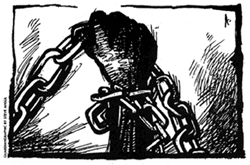This report was produced with the collaboration of Ogijiita Pimatiswin Kinamatwin, The Community Education Development Association, The Canadian CED Network, Maintain the Momentum and Make Poverty History Manitoba.
For a copy of the full report, please click here.
On September 20, 2011, a few months after winning a majority election, Stephen Harper’s Justice Minister, Rob Nicholson, tabled Bill C-10, the Safe Streets and Communities Act. The bill was passed in the House of Commons in early December and has proceeded to the Senate.
The bill is intended to prevent crime by increasing the amount of time an individual would spend in jail or youth custody. Jail time will increase through the restrictions on conditional sentences and the additional mandatory minimum sentences. This punitive approach has been widely used – and subsequently rejected – in both the United States and Great Britain over the last 35 years.
Tracy Velázquez, executive director of the Washington-based Justice Policy Institute stated that:
Republican governors and state legislators in such states of Texas, South Carolina, and Ohio are repealing mandatory minimum sentences, increasing opportunities for effective community supervision, and funding drug treatment because they know it will improve public safety and reduce taxpayer costs. If passed, C-10 will take Canadian justice policies 180 degrees in the wrong direction, and Canadian citizens will bear the costs.
Together, the CCPA Mb. and The John Howard Society of Manitoba Inc. have prepared a report that explains just what those costs will be, and then redirects the spending. It tells the truth about limiting solutions to those that focus only on making offenders deal with the consequences of their actions (the punitive approach doesn’t always work) and it goes to the root causes of crime. In other words, it invests in prevention and rehabilitation rather than in ineffective and costly punishment through incarceration.
Bill C-10 will have a direct impact on rates of incarceration. The Correctional Service of Canada is predicting an 8 per cent increase in inmates per year. At the provincial level, the increase will likely be three or four times higher (putting it in the range of 24 to 32 per cent) given that the vast majority of minimum sentences will be served as ‘provincial time’. Added to that, the provinces will see an increase in remand wait times, as mandatory minimums make plea bargains less attractive, causing more cases to proceed to trial. All these changes will further burden our already financially strapped courts and prisons, but will not reduce instances of crime.
The Truth about Consequences
An obvious flaw of a punitive approach to reducing crime is that it assumes those breaking the law will think logically and consider the consequences of their actions in advance. In reality this simply doesn’t happen. People don’t always think before they act, or they assume they won’t get caught; they may be high, intoxicated or mentally ill which impairs their ability to think about or understand the potential consequences of their actions. Obviously a punitive approach will have little or no impact in deterring crime when someone isn’t acting or thinking logically.
Another flaw in the punitive approach is its ‘one size fits all’ approach which doesn’t look at the specific needs of different regions. As a result, inner-city neighbours, suburban areas, northern and rural areas all receive the same strategy despite huge differences in crime rates. What is needed instead is an approach that begins by examining the problem and seeks to address specific issues that cause crime. This approach is much more cost effective.
Incarceration is extremely expensive, costing anywhere from $65,000 to $130,000 a year to house a single inmate, depending on the type and level of custody. These are just the operating costs – rising inmate populations mean increased capital expenditures as well. Neither the federal government nor the government of Manitoba have revealed how much Bill C-10 will cost the provinces. The John Howard Society of Manitoba has calculated that Bill C-10 will cost the Province of Manitoba an additional $60 million a year in operating expenses, plus $30 million in capital expenses for a total of $90 million.
Justice Minister Andrew Swan has stated that Manitoba will find the money, whatever the amount, to cover the costs of Bill C-10. But when anti-poverty advocates point out the link between poverty, social exclusion and crime (a connection the federal government itself acknowledges), there is never any money available to deal with the root causes. Why then is there so much money available to dispense punishment once the crimes have been committed and the harm is done?
The jointly-produced report recommends how to better spend the $90 million/year that Bill C-10 will cost the Province of Manitoba. It begins by examining some of the risk factors and lived experiences commonly found in the prison population. Those risk factors include: living in poverty, dealing with racism, being chronically unemployed, living with a lack of education, suffering the effects of colonization, not having access to adequate housing, and struggling with mental illness. The cumulative effects of these risk factors leave people in desperate conditions.
The report’s recommendations inject hope into the lives of those at risk of offending and those who have already had contact with the system. It directs the $90 million into four areas where the prison population is most in need: employment; education; public housing; and, addictions treatment and mental health supports. As experience has shown in the US, these sorts of investments will reduce crime; filling more prisons with more inmates will not.
The report gives details as to why $90 million dollars would be much better spent in these areas: it represents an investment in prevention rather than a cost for punishment.




